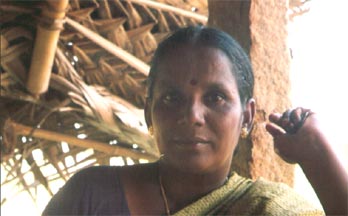Feb 27, 2026
Feb 27, 2026
 Valarmathi, 45, is one of those rare women farmers whose work is recognized by leading agricultural research institutions. She received a district-level award for being the best soya-grower in the area. The Tamil Nadu Rice Research Institute, near Kumbakonam (Thanjavur district), is full of praise for Valarmathi for having managed to obtain a very good yield of rice by trying out a new method of cultivation - the System of Rice Intensification (SRI).
Valarmathi, 45, is one of those rare women farmers whose work is recognized by leading agricultural research institutions. She received a district-level award for being the best soya-grower in the area. The Tamil Nadu Rice Research Institute, near Kumbakonam (Thanjavur district), is full of praise for Valarmathi for having managed to obtain a very good yield of rice by trying out a new method of cultivation - the System of Rice Intensification (SRI).
22-Aug-2004
More by : Kavitha Kuruganti

|
she is my mother |